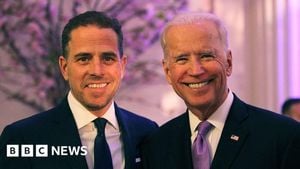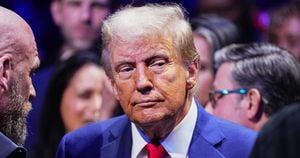Norway's sovereign wealth fund, recognized as the largest globally, has recently made waves with significant shifts to its investment portfolio. This follows its decision to terminate engagements with specific companies due to ethical concerns surrounding their operations.
One of the most notable moves involves the total divestment of shares from Israel's Bezeq, the country's leading telecommunications provider. Bezeq was found to facilitate illegal activities linked to Israeli settlements within the occupied West Bank. According to the fund's ethics watchdog, the Council on Ethics, the company's operations are contributing to the maintenance and expansion of these contentious settlements, which defy international law. The Council stated, "The company, through its physical presence and provision of telecom services to Israeli settlements in the West Bank, is helping to facilitate the maintenance and expansion of these settlements, which are illegal under international law." This assertion highlights the growing recognition within global finance of the ethical responsibilities tied to investments.
This divestment aligns with the fund's renewed focus on ethical investing, particularly since the Council on Ethics has adopted stricter interpretations of its ethical standards. The fund, officially known as the Government Pension Fund of Norway and boasting assets worth approximately $1.8 trillion, invests broadly across varied sectors but must now navigate increasing scrutiny over the social and environmental consequences of its investments.
Meanwhile, the Norway wealth fund is preparing to explore the financial landscapes of cryptocurrency and gambling firms due to potential money laundering risks. The fund's Council on Ethics has declared plans for deep investigations of companies operating within these high-risk sectors starting next year. This initiative arises from the alarmingly high instances of financial irregularities tied to these industries, prompting concerns from many global regulators.
Specifically, on October 10, the Council on Ethics presented its intentions to the finance ministry, emphasizing the need to closely examine "companies involved in cryptocurrencies and gambling/casino," noting the significant risk of money laundering associated with these sectors. The potential for unethical practices surrounding cryptocurrencies particularly stands out, as these assets operate under decentralized systems, making oversight and regulation considerably challenging.
The fund's existing holdings reflect its extensive involvement across various influential companies. For example, it possesses around 0.83% of Coinbase Global Inc., one of the most recognized cryptocurrency exchanges, valued at about $453 million, as well as stakes amounting to 2.13% in Flutter Entertainment Plc, valued at around $691 million, and about 0.87% of MGM Resorts International, worth approximately $121 million. The measures being undertaken reflect the fund's commitment to ensuring compliance with its ethical investment guidelines.
Critics of the gambling and cryptocurrency sectors continuously warn about their vulnerability to money laundering and fraudulent activities. Various studies, including insights from the UN Office on Drugs and Crime, indicate the growing prevalence of money laundering activities tied to online gambling platforms and cryptocurrency exchanges, particularly across regions like Southeast Asia. Jeremy Douglas, the Regional Representative for Southeast Asia and the Pacific at the UNODC, stressed the impact of poorly regulated online platforms, stating: "The rise of underregulated online gambling and crypto platforms has significantly impacted the money laundering ecosystem across our region."
Interestingly, Norway has emerged as one of the most crypto-friendly countries globally. A report by Ernst & Young indicates roughly 14% of Norwegian men possess crypto assets, situationally positioning the nation with the likes of Germany and France as leading adopters of cryptocurrency. Nonetheless, this rapid growth has prompted Norwegian regulators to express concerns over the environmental ramifications of crypto mining, which clashes with national sustainability objectives.
Moving beyond the purviews of the digital economy, the Council on Ethics has plans to investigate the working conditions at several shoe manufacturers by 2025. The footwear sector has gained attention for its employment practices, often marred by long working hours, insufficient wages, and limitations on workers’ rights to unionize. Despite brand initiatives to promote ethical practices, many shoe companies have faced scrutiny over their supplier agreements.
Major names such as Nike Inc., Adidas AG, and Puma SE have been highlighted due to the size of their partnerships with the fund. Adidas, for example, has claimed to implement various measures to guarantee fair and secure working environments over the last 25 years, which include exhaustive factory audits. Puma has similarly stated all suppliers are legally bound to uphold specific codes of conduct.
The Council on Ethics plays a pivotal role by reviewing companies within the fund's portfolio to ascertain their adherence to ethical standards relating to human rights, environmental stewardship, and anti-corruption practices. Should the Council discover breaches of these criteria, it possesses the authority to recommend divestment or the placement of violations on public watch lists. Currently, the fund has excluded nearly 189 firms on ethical grounds, including prominent companies such as Airbus SE and Boeing Co., linked to nuclear weapons production, as well as Glencore Plc and RWE AG for their coal-related activities.
Behind this framework, the board of Norway's central bank — which oversees the wealth fund — carefully considers recommendations from the Council of Ethics. While the bank mostly follows the Council's suggestions related to exclusions, it also possesses the discretion to engage directly with corporations or issue warnings urging them to adapt their practices.
It’s noteworthy to mention, during the complex divestment process, the names of companies undergoing scrutiny are not immediately revealed until after the fund has concluded the sale of its shares. This strategy aims to mitigate potential disruptions to market stability. The entire process can stretch over varying timeframes, from mere weeks to months, dependent on the scale of the assets involved.
The actions undertaken by the Norway wealth fund, amid its significant portfolio transitions and investigations, are reflective of broader trends concerning ethical investing. It reflects increased pressure on fund managers to align investment strategies with responsible and sustainable practices, setting precedents across the global investment community.



